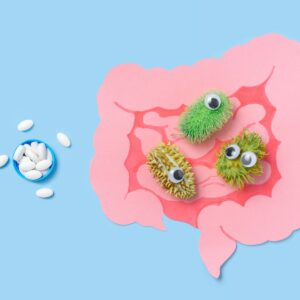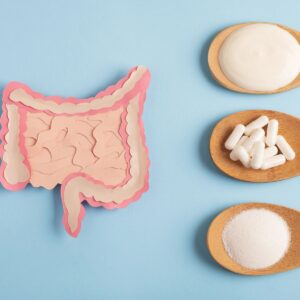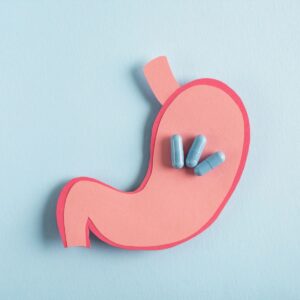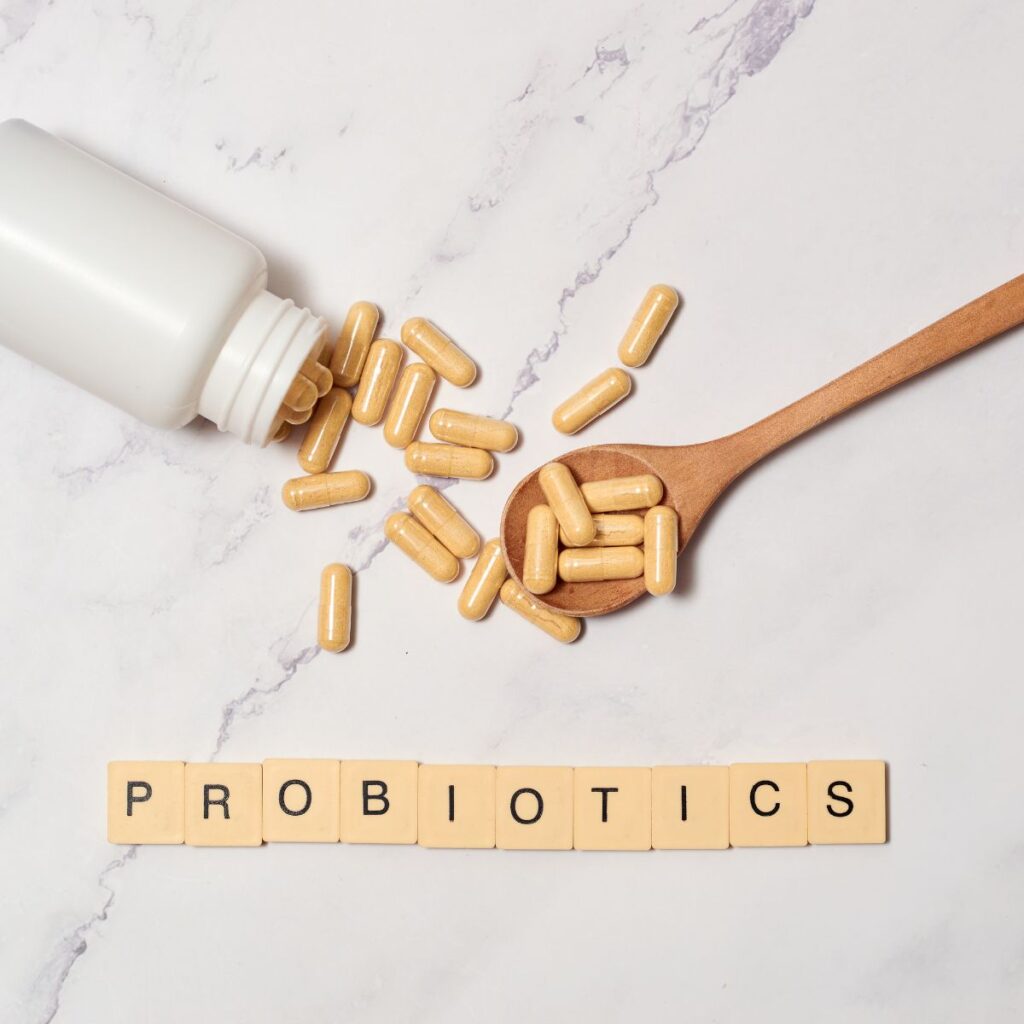Blog
How to Pick the Best Probiotic Supplement According to Your Health Condition
Did you know there’s an important super supplement that can benefit nearly every part of your body? The answer is probiotic supplements—those tiny, beneficial bacteria also known as microbiome—are essential for more than just digestive health. They play a major role in immunity, metabolism, minerals balance and mental health. In the gut, beneficial bacteria are in constant communication with our immune system—about 70% of which is located in and around the gut! These bacteria play a direct role in modulating immune responses and helping keep us healthy.
Conditions that lead to a deficiency or lack of diversity in our gut microbiome have been linked to psychological, immunological and cognitive issues, with some studies indicating a potential connection to conditions like Alzheimer’s in the long term if not addressed early.
Probiotics offer a broad range of health benefits, but it’s essential to know that different illnesses may require different strains of these helpful bacteria. It is not one solution that fits all problems in the body
Some surprising facts about gut bacteria and microorganisms:
They outnumber our cells—did you know that those tiny, single-celled organisms actually outnumber human body cells by 100 times! Trillions of these microorganisms inhabit our body, especially the gut.
Diverse and multiracial: Did you know that gut bacteria have similar characteristics to the human population? They come in different tribes and strains just like the human race. Under the umbrella of “microorganisms,” we find bacteria, fungi, parasites, and yeast. However, bacteria make up 90% of the gut’s population. These microbes work in “tribes” or groups to offer incredible health benefits.
- Genetic Power: These beneficial bacteria have their own genetic material, which actually affects our body’s gene expression, helping prevent chronic diseases.
- Heavy&Mighty! Probiotics collectively weigh around 2 kg, even more than the human brain.

- Nature Anti-depressant: Did you know that these friendly microbiomes are nature-made antidepressants. Studies showed that the microbiome releases approximately 90% of our happiness hormones like serotonin, dopamine, and GABA, which collectively control our mood, sleep, and energy; therefore, mental health is strongly connected to gut health.
Key Benefits of Probiotic Supplements
Probiotic supplements support health from multiple angles, offering benefits such as:
- Boosting immune health
- Maintaining a healthy digestive system
- Enhancing mental well-being
- Reducing risks of autoimmune, inflammatory, and allergic conditions like eczema
- Supporting metabolism for effective weight loss
- Protecting the intestinal barrier
- Enhancing nutrient absorption
Who Should Avoid Taking Probiotic Supplements?
While probiotics are safe for most, some conditions may require caution:
- SIBO (Small Intestinal Bacterial Overgrowth) and IBS (irritable bowel syndrome): For these conditions, a minimum 3-week gut-healing protocol is often recommended before starting probiotics to help restore a healthy balance and prepare for a solid gut environment.
- Weak Immune System or Cancer: Those with weakened immunity should consult a healthcare provider before using probiotics.
Choosing the Right Probiotic for Each Clinical Conditions

Imagine the beneficial bacteria in your gut as different tribes, each with its unique strengths and purpose. More diversity among these bacterial “tribes” means more health benefits. Scientifically, these bacteria belong to large groups, called genera, like Lactobacillus, Bifidobacterium, Saccharomyces, Streptococcus, Enterococcus, Escherichia, and soil-based Bacillus. Each genus, or “tribe,” is also made up of various subspecies and strains—like a family with many cousins and siblings.
Choosing the right probiotic supplement to support your specific health condition means looking closely at the supplement label for strains that have been clinically shown to be beneficial for your particular needs.
Let’s explore which probiotic strains are best suited for each specific health conditions:
- Autoimmune & Allergy diseases (like eczema and urticaria): Lacticaseibacillus rhamnosus, is effective for eczema, urticaria, and immune support. It helps calm the immune system, heal leaky gut, and reduce histamine levels. A Swedish study in the American Journal of Immunology even shows that giving children this strain reduces their risk of eczema by up to 60%.

- Recurrent vaginal candida and UTIs, Lactobacillus acidophilus and Lactobacillus reuteri are highly beneficial probiotic strains. These strains produce lactic acid, which helps maintain an acidic environment in areas such as the vagina, urinary tract, and parts of the digestive system. This naturally acidic environment makes it difficult for infections like Candida and harmful bacteria or fungi to thrive.
- In addition to creating an inhospitable setting for pathogens, these probiotics enhance immune defense by boosting the production of immune cells and antibodies specifically targeting Candida and bacteria that can cause vaginal or urinary infections..
- Digestive Health: For issues like gastritis, H. pylori,IBS, SIBO, Crohn’s disease or Ulcerative Colitis; there are 3 probiotics strains that are designated to maintain gut health, they are; : Lactobacillus, Bifidobacterium, and Akkermansia muciniphila.
These superbug help in:
- enhancing digestive function
- boost the secretion of digestive enzymes
- enhance the absorption of vitamins and minerals
- Regulate bowl movement (so avoid diarrhea and constipation )
- Heal gut inflammation and strengthen gut lining.
Note that, Akkermansia, often called the “queen of healthy bacteria,” plays a key role in strengthening the gut lining by producing a fatty acid-like substance with a mucus-like texture. This protective layer reinforces the gut barrier, supporting overall gut health.

- Mental Health (primary depression, panic attacks, insomnia ): Bifidobacterium infantis, produces neurotransmitters like serotonin and GABA, which help improve mood, energy, social interaction, and sleep. Studies show people taking this strain often report increased mental clarity and positive mood shifts within two weeks.
Who needs to take Probiotic supplements?
While healthy individuals can benefit from probiotic-rich foods (yogurt, sauerkraut, kefir, etc.), specific groups may benefit more from probiotic supplements, such as:
- Travelers: Taking probiotics a week before and during travel can help balance gut bacteria.
- Cold or Respiratory Infections: Studies suggest probiotics can bolster immune defenses and speed recovery
- Frequent Swimmers: Chlorine exposure can disrupt gut bacteria diversity and therefore taking probiotic supplements during summer and swimming season is highly important.
- Antibiotic Users: Probiotics can help rebalance gut bacteria during and after an antibiotic course. Always make sure to consume probiotics 2 weeks post antibiotic therapy course.
- Digestive Issues: Those with IBS, SIBO, IBD, H. pylori, or reflux, can benefit greatly from the intake of a good quality probiotic at the right time.
- Allergies & Skin Conditions: Certain strains can modulate the immune system, boost antibodies production and reduce allergy symptoms.Mental Health Concerns: Probiotics can support emotional health, particularly for anxiety and depression.
- Recurrent vaginal infection and UTI
What will be the right dose for Probiotics supplements: Count the Colony-Forming Units (CFUs)
For most conditions, a dose between 20–50 billion CFUs is recommended for 2–4 weeks.
Best time to take your probiotic capsule?
Taking probiotics first thing in the morning, ideally on an empty stomach or with a bit of healthy fat (like olive oil), can help them thrive through the whole digestive tract.
How to Choose the Best Probiotic Supplement
- Colony-Forming Units (CFUs): Ensure you’re focusing on the CFU count and the variety of strains.
- Bacterial Strains: Select supplements with clinically studied strains.
- Testing: Look for third-party tested or certified as GMF , non-GMO products, ideally with stable shelf lives.
- Live Cultures: “Live and active cultures” are generally more effective than those labeled “made with active cultures.”
- Shelf Life: Avoid short-shelf-life probiotics to ensure you’re getting maximum benefits.
Supporting Gut Health Beyond Probiotics
Probiotics alone can’t solve all gut health issues. They thrive best in a balanced gut environment that includes a strong gut lining, a fiber-rich diet for feeding good bacteria, and an anti-inflammatory lifestyle to keep bad bacteria from taking over. For long-term gut health, consider these additional lifestyle practices:

- Eat Green Leafy Vegetables: A variety of greens supports beneficial bacteria.
- Consume Green Sprouts: Chlorophyll-rich sprouts are excellent for gut health.
- Practice Fasting: Intermittent fasting or traditional fasting, like Islamic fasting, can promote bacterial diversity.
- Eat Fermented Foods: Incorporate foods like kefir, kombucha, fermented rice, and miso to boost beneficial bacteria naturally.
- Use Healthy Fats: Healthy fats support the gut, while hydrogenated and processed fats may disrupt it.
- Spend Time in Nature & With Pets: Interaction with nature and animals can increase microbial diversity.
- Include Prebiotic-Rich Foods: Foods like onions, garlic, artichokes, dandelion greens, arabic gum, and jicama are “food” for probiotics and help beneficial bacteria thrive.
In conclusion, probiotics are a powerful tool for whole-body health, supporting everything from immunity to mental wellness. By choosing the right type and dosage, you can make the most of these “friendly bacteria” and enjoy a healthier, happier life.
to know more about probiotic supplements and benefits of each bacteria strain, follow the link below in order to watch the full episode of Dr. Fajer Al Jumairi on her youtube channel:

